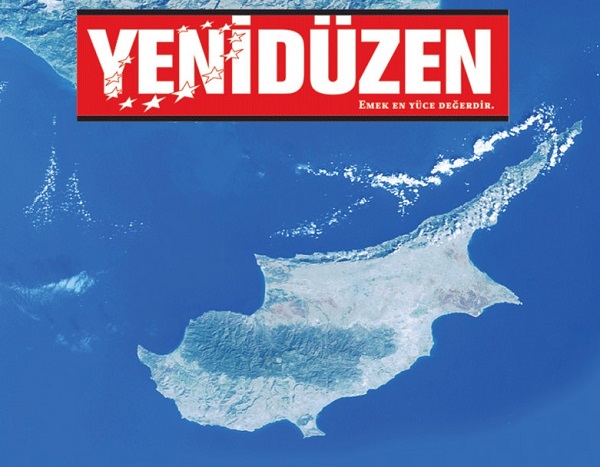
Ένα άκρως ενδιαφέρον άρθρο εμφανίστηκε χθες στην Τ/Κ εφημερίδα Γενί Ντουζέν. Το άρθρο υπογράφει ο καθηγητής του πανεπιστημίου Κύπρου Νιαζί Γκιζίλγκιουρεκ και αποκαλύπτει το παιγνίδι της Άγκυρας, αλλά και της Τ/Κ ηγεσίας στο θέμα των συνομιλιών.
Το παραθέτω αυτούσιο και παραθέτω στη συνέχεια κάποια δικά μου σχόλια:
15.10.2013
Niyazi Kızılyürek
Pre-Negotiation Maneuveurs and CTP
Özdil Nami and Ahmet Davutoğlu, who recently met in Ankara, surprised everyone who is expecting a solution with the statements they made ahead of the Cyprus negotiations. Özdil Nami underlined that “Turkish Cypriots need to integrate into the world,” and expressed desire for a “solution” in two months: "We set March 2014 as the target date. We want to hold a referendum on a comprehensive solution on the island before this date and to make the comprehensive solution a reality." Nami claimed that important steps have been taken in the negotiations to the date, and added that these cannot be ignored. "This problem should not exceed 50 years. If this is not possible, the world should come up with a different answer to the question of 'What should be done in Cyprus?" said Nami.
Let me make a reminder first. The “important progress made in negotiations” to date, consist of topics, which the Turkish side mostly “took.” Such as Governance, Power-sharing, EU and Economy… In topics such as Territory, Property, Security and Guarantees, which the Turkish side has to “give,” there has been either no progress at all or no important progress. Moreover, the Turkish side has hardened its stance on these issues over the past years.
As it may be understood from Özdil Nami’s speech at the Diplomacy Reporters Association in Ankara, the Turkish side has retracted from its position in the Annan Plan regarding Territory: "We, as the Turkish side, have conveyed to our counterpart that we will not be able to make the territorial concessions we made in the Annan Plan. Ten years have passed since then. There have been additional investments in regions except Varosha, which were subject to territorial adjustments. Life goes on. For that reason, it is more difficult to make the same concession. But the territorial adjustment will be more or less similar to how it was in that map."
The Property topic is, as Nami confessed a “thorny” issue. “The thorniest of the outstanding issues is the property issue," said Nami. But there is another issue that is more difficult than all of the rest. The parties are at poles apart over Security and Guarantees, which is deemed very important by the Greek Cypriot side.
The Turkish side wants the Guarantee and Alliance agreements signed in 1960 to continue as they are. There is no leader on the Greek Cypriot side, who would say “yes” to this! If we are to summarize all this, the parties have not converged on the issues of Territory, Property and Security. Separately, it is not yet clear how the federal state will be established.
The Greek Cypriot side advocates that the Cyprus Republic should be restructured and transformed into a bi-zonal federal state. They want the establishment of a kind of a “Second Cyprus Republic.” The Turkish side on the other hand, is fixated on the “virgin birth” spell at the best. Claiming that the Cyprus Problem may be solved in two months when there are so many divergencies, and when the negotiations are being carried out by Osman Ertuğ, could only be a tactical manoeuvre.
What they are actually trying to say is, “We either solve the Cyprus problem in two months or the world has to leave aside the quest for a federal solution and move towards a two-state solution.” Last March, Davutoğlu had said, “we are ready to negotiate a two-state solution.” What a two-state solution would mean for Turkish Cypriots could be the subject of another article. Let me just say that this, under the current conditions, would mean becoming Turkey’s Gibraltar in Cyprus at the best.
It seems that Turkey is trying to do away with the federal state model by creating an artificial “urgency” about a federal solution. In other words, this “hastiness” is aimed at other plans… As a matter of fact, Sami Kohen, who usually has good information about what is going on behind the scenes, wrote in the Milliyet newspaper on 11 October 2013: “It seems to us that the notion that the new negotiations process will be the “end” is strengthening among the Turkish side. There is a large number of people, who believe that formalising the independence of the TRNC is the best way to end the problem if there is no solution this time either. In his speech in Ankara, TRNC Foreign Minister Özdil Nami talked about “integrating” the TRNC “into the world” in that case. There is no doubt that the government has such a B plan. But it is giving a (maybe the “last”) chance to negotiations aimed at reconciliation.” All the signs confirm Sami Kohen’s view.
Davutoğlu does not hide that they discussed “the recognition of TRNC” with Nami. If this “time engineering” – the Turkish side says it wants a “solution” by the end of the year regardless of when the negotiations begin – is a tactical move aimed at pressuring the Greek Cypriot side into a solution, we can say that it is a useless, wrong approach that will not give rise to a result. If it is a policy aimed at essence, it is unacceptable anyway.
It is impossible to legitimize the TRNC, which was established on a territory, 80 per cent of which belongs to Greek Cypriots, who have been forced out at gunpoint. It should be known that the Cyprus Problem is not merely a problem of “Turkish Cypriots’ integration into the world.” At the same time, it is a problem of restoring the violated rights of Greek Cypriots. For this reason, what is expected of the Turkish side is not to try and corner the Greek Cypriot side in a semi-tearful manner, but to act with a sense of responsibility and put forward strong will in terms of a federal solution.
If we are to take into consideration the historical context of the Cyprus problem, the most maximalist demand of the Turkish side, which was a federation based on geographical terms, has been accepted and has become a UN parameter. Other Turkish demands have also been met. Now, everyone accepts that Turkish Cypriots are not a minority but a politically-equal community. And as regards banning Greek Cypriots’ unification with Greece – which was a matter of life and death for the Turkish side – Enosis no longer has a place in the minds, hearts or agreements.
What is expected of the Turkish side after all these is to help bring to life the federal state structure, which was a Turkish demand. To embrace the notion of a state that respects human and citizen rights and which emphasizes the maxim of unity among diversity. Not to advocate a structure similar to the pre-modern Ottoman Community System, in which the communities stay away from mutual interaction and travel in separate wagons. While it is impossible to have such an approach accepted by the world at a time when social mobility has peaked, it is also unacceptable to establish two separate “Ethnic-Ghettos” side by side. The solution should be based on the principle of a federal, democratic state, and the notion of a pluralistic community.
By the way, where is the Republican Turkish Party (CTP) while all these are being discussed ahead of the negotiations? Where does it stand when it comes to the Cyprus problem? Does it think that the negotiations will be finalised in two months? Or does it adopt bringing forward the recognition of the TRNC and a two-state solution unless a solution is found as soon as possible, as stated by Ahmet Davutoğlu, Derviş Eroğlu, Egemen Bağış and Özdil Nami? Doesn’t the party have anything to say regarding the Cyprus problem? When will CTP, which owes its existence to being a party for peace, break its silence?
*This article was originally published in the Yenidüzen newspaper.
Η Τουρκική πλευρά επιδιώκει είτε να εξασφαλίσει ως βάση των συνομιλιών και της λύσης της δική της θέση για λύση δύο κρατών, ή να οδηγήσει τις συνομιλίες σε αδιέξοδο αφού προηγουμένως έχει προετοιμάσει το έδαφος σε μια τέτοια περίπτωση να «αναζητηθούν άλλες λύσεις», δηλαδή λύση δύο κρατών. Από αυτή την άποψη η θέση ότι δεν θα αρχίσουν συνομιλίες αν δεν υπάρξει συμφωνία στη βάση και τη μεθοδολογία είναι απόλυτα ορθή. Όπως ορθή ήταν η θέση ότι δεν θα έπρεπε να τεθεί θέμα βάσης αλλά να αρχίσουν οι συνομιλίες στη βάση των προηγουμένων, έστω και αν η παρούσα κυβέρνηση ήθελε να αποσύρει ορισμένες από τις θέσεις που είχαν τεθεί από την προηγούμενη. Η άρνηση όμως να γίνουν συνομιλίες δεν είναι αρκετό. Θα πρέπει να εξαργυρωθούν ΑΜΕΣΑ και αποτελεσματικά η ξαφνική ταύτιση των Βρυξελλών και της Ουάσιγκτον με τις θέσεις του Προέδρου της Δημοκρατίας. Εδώ όμως χρειάζεται μεγάλη προσοχή. Η τακτική της Τουρκικής πλευράς είναι να εμφανίζεται ότι αποδέχεται μια θέση της Ε/Κ πλευρά, αλλά παράλληλα θέτει δέκα άλλες θέσεις που θέλει την Ε/Κ πλευρά να αποδεχθεί. Και με αυτή την τακτική θα επιδιώξει να πετύχει να τεθεί στο τραπέζι το θέμα του φυσικού αερίου.
Το παιγνίδι στο Κυπριακό χοντραίνει.
Πληροφορίες από τα κατεχόμενα αναφέρουν ότι το άρθρο προκάλεσε συζητήσεις ως προς τη στάση της Τ/Κ ηγεσίας, η οποία εμφανίζεται πια με τις δηλώσεις Ναμί να παίζει πειθήνια το παιγνίδι του Νταβούτογλου και της Άγκυρας. Συζητείται παράλληλα θέμα στάσης της Τ/Κ αριστερά όπως εκφράζεται από το CTP,το Ρεπουμπλικανικό Τουρκικό Κόμμα, στο οποίο ανήκει ο Οζντιλ Ναμί. Η εξέλιξη αυτή στο ΤΡΚ θεωρείται άμεσο αποτέλεσμα των χειρισμών του Μεχμέτ Αλί Ταλάτ. Και επιβεβαιώνει το αίσθημα πολλών Τ/Κ ότι ως κοινότητα είναι πια παγιδευμένοι μεταξύ της Άγκυρας και των Ε/Κ.
Γράφει: Κώστας Γεννάρης






